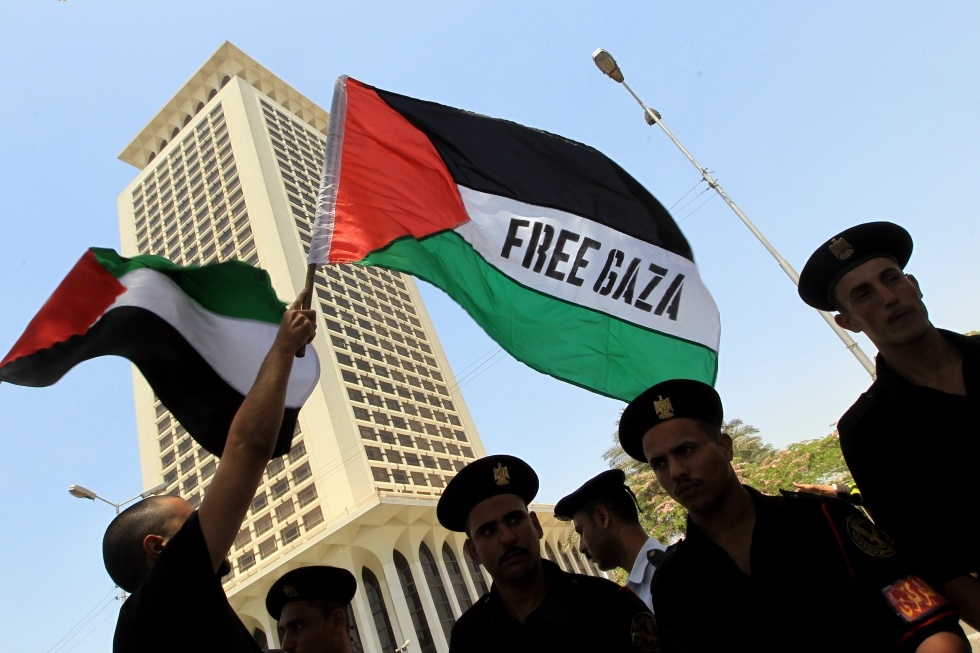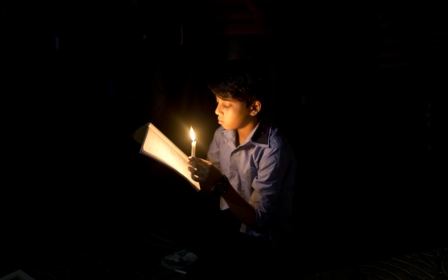For Palestinians in Egypt, Gaza is a world away

CAIRO - You would never know what it happening in Gaza tonight. It is midnight, outside a cafe in the middle of Cairo and a television is blaring out some Ramadan program; something about a doctor - or was it a soldier? - and a love interest with large eye-lashes.
Antar, originally from Tel Awa neighbourhood in Gaza City, is talking about what's happening back home when the television's volume again invades the conversation. "Nobody [in Egypt] asks me about the situation there, or how my family is," Antar smiles blankly, shrugging his shoulders.
"They don't care! They really don't care," adds Antar who did not want to give his full name for safety reasons adds.
Asaad, another Gazan living Cairo, joins the conversation outside the cafe. Talk quickly moves to whether Egypt should have a role in any future deal between Hamas and Israel. After an Egyptian-Israeli ceasefire proposal, reportedly drawn up without consultation with Hamas or other Palestinian factions in Gaza, Assad doesn't think so.
"Well, who else…Qatar?" Asaad, who describes himself as a leftist, asks with a sarcastic grin.
Nor does he have much hope for a Turkey-brokered deal.
"Turkey? Erdogan is busy right now…and he only ever used to play the Palestinian card…" Assad adds, while explaining that he doesn't think Erdogan has ever been really serious about Palestine and has only used the cause for political gain.
But despite the lack of viable brokers, Asaad claims Gaza should stop turning to Egypt. "We don't need the Egyptians to help us - we just need Rafah," he says. "If they don't care about Palestine, just open Rafah."
The crossing, which acts as a key supply line to Gaza, has been largely closed since last year. Egypt has also refused to open it since Israel launched Operation Protective Edge on 8 July, despite scores of Palestinians desperately trying to flee the fighting.
Ceasefires on hold
Since the latest flare-up in Gaza - which has left at least 500 Palestinians and 18 Israelis dead - there is a growing perception amongst some Palestinians in Egypt that Cairo is working against them.
Egypt has traditionally played the role of mediator, through its intelligence services, in any conflict between Israel and Hamas. During Israel's 2012 Operation Pillar of Cloud, former Egyptian President, Mohamed Morsi used organisational links between Hamas and the Egyptian Muslim Brotherhood to negotiate a ceasefire agreement.
The agreement was meant to be binding but following the military takeover last summer, the Egyptian government has turned its back on Hamas. They blame the movement for destabilising the Sinai Peninsula through smuggling - with the help of Muammar Qaddafi's plundered weapons stocks - and also for terrorist attacks which have left scores of police and army troops dead in the past year.
Last Thursday, Egypt's Foreign Minister Sameh Shoukry blamed Hamas and its regional allies, including Turkey and Qatar, for failing to end the impasse. "If Hamas had accepted the Egyptian proposal, it could have saved the lives of at least 40 Palestinians," Shoukry said, according to the official MENA news agency. Israel and the US State Department have issued similar condemnations.
Asaad is no fan of Hamas, but he does support the Palestinians' right to resistance. "Hamas has had lots of problems recently, everyone knows that," he explains. "They lost control two months ago and don't have a plan beyond rockets.
"They have said no to Egypt's [ceasefire] and they're saying nobody talked to them about the deal anyway. But they have a right to say no - to refuse - until people are talking with them," he adds.
Once a genuine deal comes together, the people of Gaza should support it, Asaad argues. "We don't really have any other option."
Food and medicine at Rafah
Instead, Egyptian assistance so far has been reserved to aid, not effective diplomacy.
The Egyptian army sent 500 tons of aid across the Rafah crossing last weekend. The government has also allowed more than a dozen Gazans to receive medical treatment in Egyptian hospitals, including in Arish, North Sinai.
Saady Ayman Saady, 18, crossed into Egypt for medical treatment, with his father, Ayman Saady, last Saturday.
"My cousin is a journalist," Saady, says while recalling how his son was hit. "His work came to take him from his house while some of their family and other neighbours were sitting outside because of the power cut.
"Then the car was targeted by a rocket," Ayman adds, as he waits for his son to recover at the Arish public hospital.
Along with Saady, seven relatives and three neighbours were injured. Saady must now have part of his spleen removed, his father explains.
After three days in al-Shifa hospital in Gaza, Saady was transferred to Arish. His father says he is thankful that Cairo has allowed at least some Palestinians to get much-needed treatment in Egyptian hospitals, although he is aware that countless others are still desperate to cross.
Atallah Yusuf, 24, from Khan Younis crossed on Thursday, after suffering a deep wound to his stomach in a separate Israeli airstrike. However, the gap between Arish and Khan Younis, is often much larger than the 40-odd kilometres that separate the two towns. The frequent blackouts in Gaza and disconnections in the turbulent Sinai, mean that Yusuf has been left all alone in the hospital. "I can't get in touch with my family because of the daily disconnection in Sinai," he says, covering his face to hide his emotions.
Gazan Palestinians entering Egypt have since been permitted to bring a relative with them, but the uncertainty and not being able to contact other relatives regularly is still tough on those being treated and their relatives back in Gaza alike.
“They tried to do something”
While small token signs of assistance can be seen, the relationship is a far cry from the last time that Israel went to war with Hamas in 2012.
Asaad, the Gaz-born Cairo leftist, says he remembers November 2012 well, when Egyptian activists crossed into Gaza while Israel's Operation Pillar of Cloud was in full swing.
"I care what the people who made the Egyptian revolution think about Gaza," he says.
However, Asaad is acutely aware that times in Egypt have changed, and he says he is confident that the new Egyptian government will act differently this time.
The different attitude is clear to see. This weekend, Egyptian activists prepared to launch a convoy of medical supplies to Gaza, although the activists and aid were sent back a few kilometres away from the Rafah border crossing.
The ability of activists to bring people onto the streets has also been hard hit. Last week, pro-Palestine protesters marched through downtown Cairo where they delivered a symbolic Ramadan iftar on the steps of the Journalists' Syndicate. Despite the relatively benign nature of the protest, only some 300 people showed up.
"The people in Egypt tried to do something, they had the protest and it was weak," Asaad claims. "I told them afterwards, it's like a protest in 2001 before the 18 days," he adds in reference to the 2011 Egyptian revolution that overthrew former strongman Hosni Mubarak.
In the past, Palestine solidarity protests were a driving force for street-level activism and displays of popular dissent in Egypt. Demonstrations for the Second Intifada and 2008-2009's Operation Cast Lead rallied solidarity. When the police shut them down and arrested participants, often in large numbers, people began to rally against the government.
Egypt's 30 June protests and subsequent coup have changed that. Hamas is seen by many in Cairo as an armed wing of the Muslim Brotherhood, which is now deemed a terrorist organisation by the Egyptian government. This has left many Egyptians unsympathetic towards Gazans in the latest Palestinian-Israeli crisis, or at least concerned that support for one, might be interpreted as support for the other.
This shift marks a significant break with the past as Egyptians have historically hostile toward Israel, despite the signing of the unpopular Camp David Accords in 1978.
Many pro-army voices have called to support the Palestinians, with Palestinian Facebook pages in turn thanking Egypt for its assistance so far but a clear rift has emmerged. Several Egyptian media presenters have gone as far as to celebrated Israel's Operation Protective Edge. Azza Sami, from state-owned newspaper al-Ahram, even extended her thanks to Benjamin Netanyahu, adding that she wished God would bring "more like [him] to destroy Hamas!" Fringe right-winger Tawfik Okasha likewise ranted: "He who defends Gaza is a dog like Hamas."
Antar says he is shocked by the shift. "We have Egyptian supporters of Israel now? Is this really how it is now?" he says.
"In the end, it's a question of different communities. There are the revolutionaries, the people who are in contact with foreigners…then there's everyone else."
Asaad, however, is more cynical. "You saw all the flags," he says, remembering the pro-Palestine Cairo march. "They're new out of the packet, just bought for the protest."
He says that police repression, which has been on the up since the overthrow of Morsi, and a general downturn in activism have choked off popular support in Egypt.
"It's not safe to have a kuffiyeh or a Palestinian flag in Egypt nowadays," Asaad adds.
Stay informed with MEE's newsletters
Sign up to get the latest alerts, insights and analysis, starting with Turkey Unpacked
Middle East Eye delivers independent and unrivalled coverage and analysis of the Middle East, North Africa and beyond. To learn more about republishing this content and the associated fees, please fill out this form. More about MEE can be found here.



